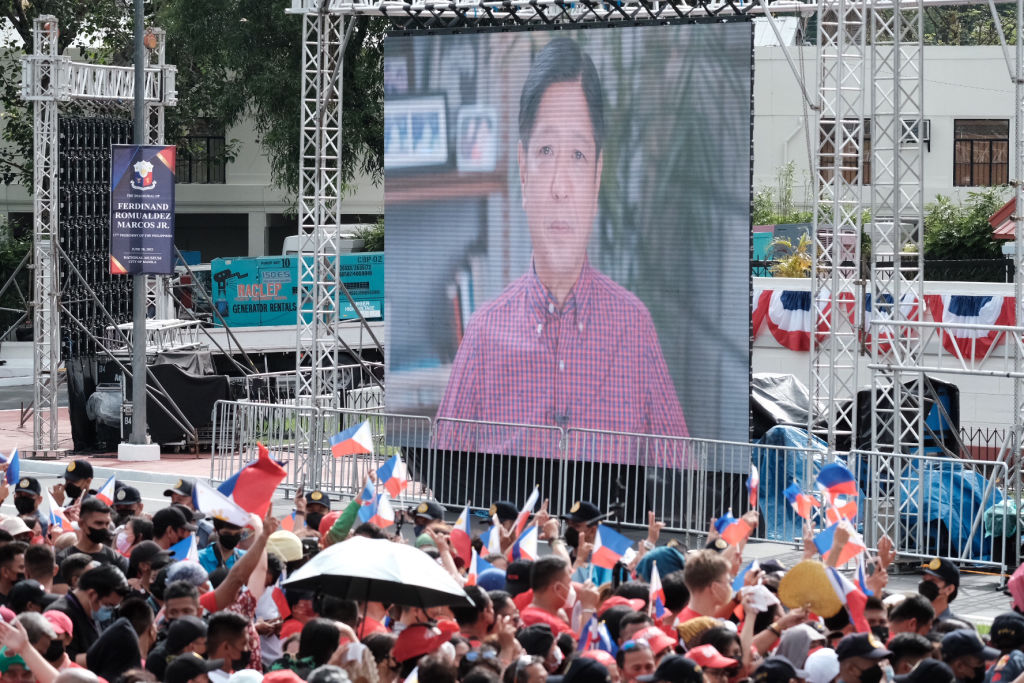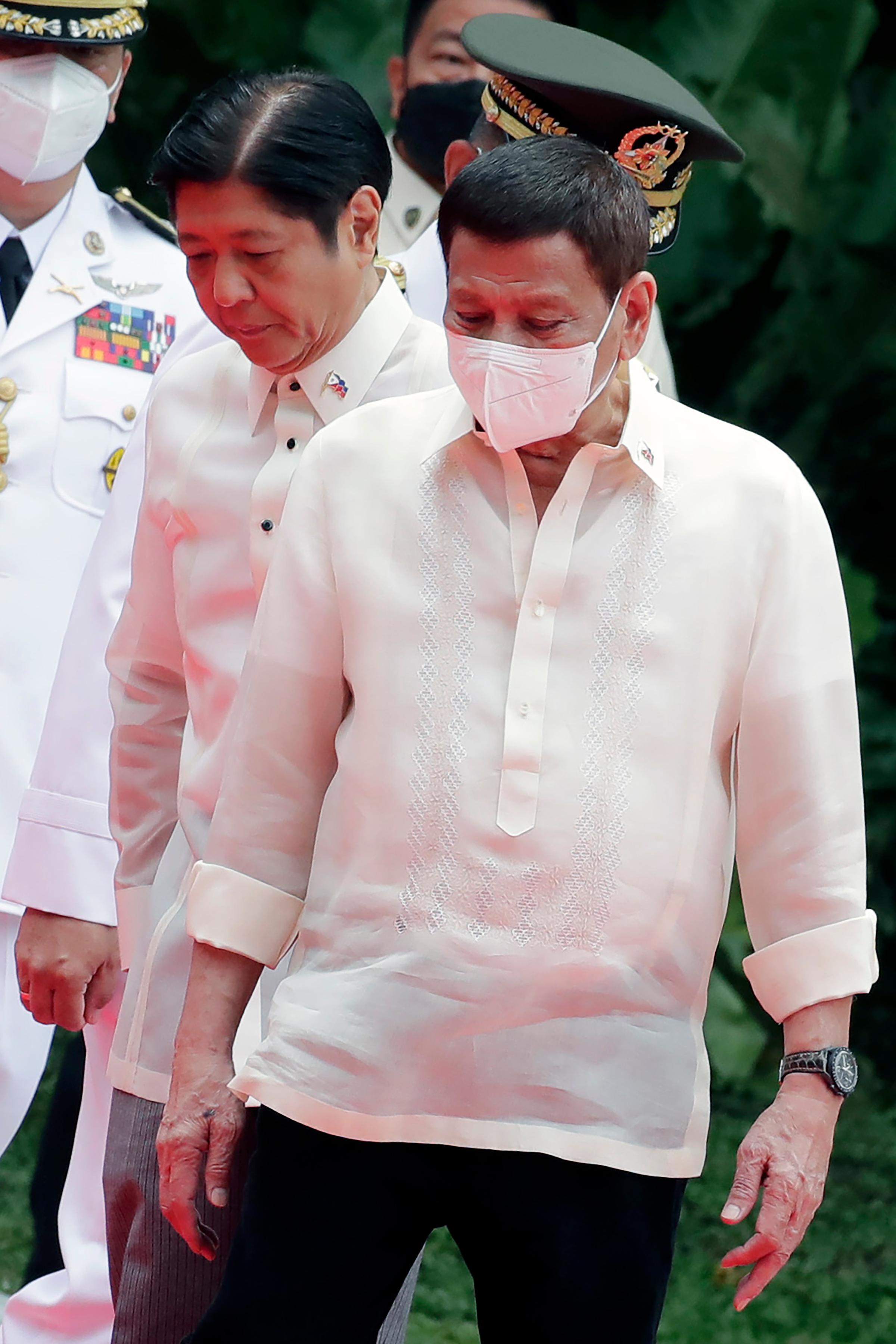
After a landslide victory in one of the Philippines’ most polarizing elections, Ferdinand “Bongbong” Marcos Jr.—a former senator and the son of a late dictator—was sworn in as the Philippines’ president on June 30.
Delegates from several countries attended the inauguration, including U.S. Second Gentleman Douglas Emhoff and Chinese Vice President Wang Qishan.
“I once knew a man who saw what little had been achieved since independence in a land of people with the greatest potential for achievement. And yet they were poor. But he got it done—sometimes with the needed support, sometimes without. So will it be with his son. You will get no excuses from me,” said Marcos Jr. in his inaugural speech, doubling down on the legacy of his dictator father.
Read more: Why the World Should Be Concerned by the Marcos Victory
Marcos Jr.’s win is the result of a decades-long whitewashing of his family’s brutal history, as well as the failed promises of succeeding governments to make life better for Filipinos after the elder Marcos was overthrown in a popular uprising in 1986.
During his two-decade rule, Marcos Sr. amassed billions of dollars in unexplained wealth and was accused of looting state coffers. Excessive foreign borrowing plunged the Philippines into debt and millions of Filipinos were mired in poverty. To quell dissent, he jailed political opponents, shut down media outlets, and imposed nine years of martial law, which witnessed tens of thousands of human rights violations.

In his ascent to the top post, the younger Marcos and his family repeatedly denied involvement in the atrocities of his father’s regime. Instead, he rode on a message of “unity” and vowed to shore up the post-pandemic economy dented by a decline in tourism and a dip in remittances from migrant workers. His selection of ministers has appeased jittery markets, but important posts, including for the health portfolio, are still unfilled.
Whether Marcos Jr. can mitigate the memory of his father’s atrocities is yet to be seen. Martial law survivors and activist groups protested against the incoming administration in Manila and New York. Protesters marched down Times Square in large numbers chanting “Never Again”.
But if former President Rodrigo Duterte’s popularity is anything to go by, it appears many Filipinos choose not to care as long as there’s food on the table. Richard Heydarian, a professor of political science at the Polytechnic University of the Philippines, says the “performative populism” of Duterte provided a blueprint for subsequent governments.
Read more: Philippines Election: How TikTok Is Helping Bongbong Marcos
“You had allegations of extrajudicial killings en masse, you had crisis in diplomatic relations right and left, you had a president who had very limited respect for basic decorum or the dignity of the office of the presidency,” Heydarian says. “And yet, as long as the economy was doing fine, [Duterte’s] popularity was high. And shockingly, even when the economy was not doing well, he maintained relatively high approval ratings.”
Grave economic challenges for new leader
Inheriting a poorly performing economy in a climate of global financial uncertainties, the incoming Marcos cabinet brings together seasoned technocrats and family allies. The country is saddled with $231 billion in national debt—roughly 63% of the GDP. Conflict in Ukraine, a looming global food crisis, and the pandemic have already slowed the world economy. With a rise in the Federal Reserve’s interest rates, fears of a global recession have increased.
J.C. Punongbayan, an assistant professor of economics at the University of the Philippines, says Marcos Jr.’s ministerial appointments have pacified a market that once worried over his vague economic plans. But he has not yet named his health, energy and foreign affairs secretaries.
“There are too many posts right now that are empty,” Punongbayan says. “There’s [also] a lot of expectations from this new government. So I think they better fill up those posts.”
Read more: Why the West Will Work With Ferdinand Marcos Jr
To curb food inflation, Marcos Jr. has himself taken over the agriculture portfolio, which he will hold concurrently with his presidency, a rare move. Heydarian says he believes Marcos Jr. is projecting himself as “the man who addresses the most important issues, including gut issues.”
But the move may also be the result of the reluctance of top experts to head the portfolio, especially after Marcos Jr. promised increasing farm output and reducing the price of staple rice grains from around $1 to $0.20 per kilogram. Rolando Dy, agriculture economist and executive director of the Center for Food and Agribusiness at the University of Asia and the Pacific, told Reuters that bringing rice prices down to this level would be “impossible.”
Reviving the Marcos legacy
Marcos Jr.’s portfolio choice is unsurprising, however, considering his late father’s agricultural programs. During the elder Marcos’ rule, the Philippines became a rice exporter, after a program aimed at increasing grain production by offering subsidized loans to farmers for buying fertilizer and equipment. (The program collapsed after it pushed rural banks into bankruptcy and drowned farmers in unpaid debt.)
Read more: Marcos Jr. and the Catholic Church: Unfinished Business
As part of his presidential campaign and amid rising food prices, Marcos Jr. said he intends to revitalize the farming sector to make the Philippines self-sufficient in food. Observers say it is part of his campaign strategy to evoke nostalgia over his father’s legacy—even though the dictator’s economic policies led the Southeast Asian country to its worst recession since World War II.
Now, he can no longer rest on his father’s laurels. Antonio La Viña, former dean of the Ateneo School of Government in Manila, tells TIME that his ability to face the many existing headwinds will determine how Filipinos will receive him. “It’s about the future now,” La Viña says.
But even his detractors would not want him to fail in managing the economy. “Because everyone loses if that happens,” says Punongbayan.
More Must-Reads from TIME
- Cybersecurity Experts Are Sounding the Alarm on DOGE
- Meet the 2025 Women of the Year
- The Harsh Truth About Disability Inclusion
- Why Do More Young Adults Have Cancer?
- Colman Domingo Leads With Radical Love
- How to Get Better at Doing Things Alone
- Michelle Zauner Stares Down the Darkness
Contact us at letters@time.com